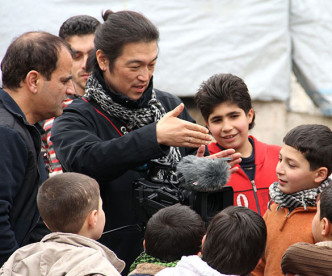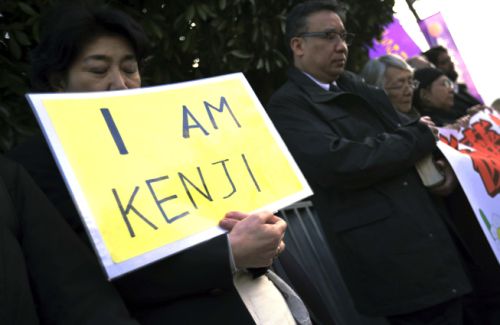
Kenji Goto, Christian Journalist, Beheaded By ISIS
Adapted & updated from Timothy C. Morgan, Christianity Today.
Japan reacts with determination and debate
On January 30, the Islamic State (ISIS) executed Kenji Goto, a Japanese Christian journalist who traveled into war zones to show the human side of violent conflict, highlighting the plight of children in these areas. Goto’s work received mixed responses from a pacifist Japanese public who is cautious about involvement in the Middle East.
Mother and wife of journalist say they remain inspired by his mission.
His mother Junko Ishido, 78, told Japanese journalists, “It is my only hope that we can carry on with Kenji’s mission to save the children from war and poverty.” Ishido says the Japanese should go forward with this peaceful path. “Kenji has left us on a journey,” she said.
Goto’s wife, Rinko, praised her husband’s love of his family and his friendship with ordinary people suffering from the ravages of war.
Goto, 47, a freelance journalist and producer, traveled into war zones to cover the human side of violent conflict for more than two decades. Goto’s journalism projects have aired on national media and he has published several books, including “We Want Peace Not Diamonds: A Confession by Child Soldier Muria”.
Before Goto was taken hostage, some Japanese antiwar activists said his trips to Syria were misguided because they were too dangerous and undermined Japan’s pacifism. The Japanese public has been extremely guarded about any involvement by Japan in the recent Middle East conflict. Article 9 of Japan’s constitution forbids Japan from making war on other nations. Only a self-defense force is legal.
But Japan’s Christian minority largely supports the nation’s pacifist stance and praises Goto’s trips to Syria in that light. The Christian population in Japan is less than 1 percent of the national population. Goto became a Christian in 1997.
In an interview with Christianity Today theologian Atsuyoshi Fujiwara talked about the debate. “There are criticisms of his action. Before leaving for Syria, Kenji left a video message that he was aware that this attempt was very dangerous and he was taking the full responsibility for his actions,” said the professor at Seigakuin University and founding pastor at Covenant of Grace Church in Tokyo.
“Yet mass media are very sympathetic to Kenji—and generally so is public opinion. They say that someone had to do this kind of work,” Fujiwara said. “And Kenji was a kind journalist who took a risk to rescue [Haruna] Yukawa [another hostage who was beheaded a week before Goto].”
Yukawa met Goto while he was doing relief work in Syria the spring of 2014. Goto directed his less experienced friend on how to maneuver the hazardous Syrian landscape. When Yukawa was captured by ISIS this past August, Goto pursued his friend into ISIS-controlled territory on a rescue mission.
Another Tokyo-based pastor commented that Goto’s faith gave his work credibility among the Japanese public, who otherwise would have viewed his heroism as adventure-seeking.
“Not only his church, the United Christian Church of Japan, but also the churches in Japan are praying for him. We think that Kenji was doing important work for peace-making.”
Goto’s wife, Rinko, recorded a video statement, saying, “My husband is a good and honest man who went to Syria to show the plight of those who suffer.”

“Somebody had to do this kind of work.” Japanese protestors urged the Prime Minister to take action after Goto’s capture. Photo: AP/Eugene Hoshiko



Leave a Reply